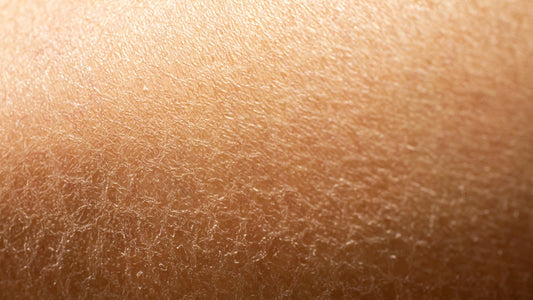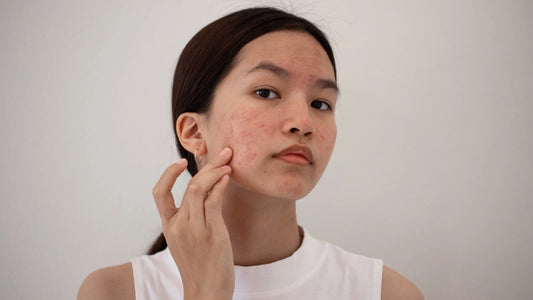Redness, itching, tightness and rough skin... All these symptoms are indicative of skin dryness. Whether caused by environmental factors or an unsuitable skincare routine, dry skin needs to be treated to restore the protective function of the lipid barrier, especially as this discomfort may be masking a skin condition such as eczema or psoriasis. Find NOOĀNCE tips and adapt your beauty routine with the best moisturising treatments for soft, radiant, flawless skin.
###soin-concentre-anti-age-nuit-1-retinol-rechargeable###
What is Dry Skin
Contrary to popular belief, dry skin does not always lack water, but lipids, and more specifically sebum. This is a skin type in its own right, distinct from dehydrated skin.
Knowing your Skin Type
Skin type varies with age, but also with the environment: heat, pollution, humidity, etc.
The nature of dry skin is rough to the touch, it itches easily and lacks suppleness. Dry skin is also thinner and very sensitive.
Do you have normal, oily, combination or dry skin? Follow our complete guide to identify your skin type, recognise dry skin and adapt your daily skincare routine.

Dry skin or dehydrated skin: what's the difference?
Dehydrated skin is caused by external factors: it's often around winter time, when the weather is dry and cold, that tightness and redness appear. Applying a cream or moisturiser generally helps to limit discomfort.
Dry skin lacks sebum, the skin barrier no longer plays its role in protecting the epidermis from external aggression and water evaporates easily, leaving skin rough and tight. This type of skin needs the right products, rich, nourishing care to restore its radiance.
The Symptoms of Dry Skin
Dry skin has several visible signs:
- Some rugosities, which can take the form of cracks for the most sensitive epidermis.
- From reddening, localised on dry areas.
- From irritation caused by dryness with a feeling of tightness.
- Constant itching, which often occurs when dry skin is left untreated and continues to dehydrate.
- A premature ageing of the skin: the dryness that sets in around sensitive areas of the face such as the eyes or lips can lead to faster skin ageing and the appearance of fine lines and wrinkles.

What causes Dry Skin
This very common skin problem can be the result of genetics, but also other factors such as the environment and lifestyle.
Genetics and Medical Conditions
Some skin conditions are hereditary: this is the case with ichthyosis, a rare genetic disorder that makes the skin extremely dry, with typical desquamation (peeling skin).
Other skin diseases have a direct impact on the quality of the epidermis: eczema (or atopic dermatitis), psoriasis or xerosis.
From hormonal variations (puberty, pregnancy, etc.) to (puberty, pregnancy, etc.).) as well as taking certain medications, particularly acne treatments, can also cause dry skin.
Âge
As we age, cellular renewal is slower and the sebaceous glands of the protective barrier work in slow motion, so they produce less sebum. This is why the epidermis becomes more sensitive to external aggression. The skin then tends to dry out and lose moisture more quickly. It also loses its natural elasticity and the first wrinkles appear.

Climate, Pollution and the Environment
Prolonged exposure to the sun for years, sometimes without sun protection, but also a dry and coldatmosphere (for example in winter, on a plane or in an air-conditioned room), are all factors that make the skin vulnerable and promote skin dryness. Our guide also tells you how to choose the right sun cream for oily skin.
The pollution also plays a role since if the skin is not protected, fine particles penetrate more easily and accelerate premature ageing but also the appearance of pimples, redness and irritation.
Inappropriate care
Finally, the application of products not adapted to her skin type leads to the appearance of discomfort linked to skin dryness. That's why it's so important not to overload your face, to use a gentle cleanser and suitable non-aggressive skin care products, and to know how to identify skin types to differentiate between dry, dehydrated and sensitive skin.
Dry skin: prevention and daily care
Choosing Good Moisturising Products
Using creams, oils and balms designed for dry skin provides the optimum level of hydration to keep skin supple and healthy. Opt for care products concentrated in moisturising active ingredients, which target skin dryness and the signs of ageing, such as our Anti-Aging Care With Retinol 1%.

Lifestyle and eating habits
Among the must-haves for beautiful skin, vitamins A, B and C are effective in deeply regenerating the skin and restoring suppleness. They promote cell renewal and collagen production. The vitamin E is moisturising and protects the epidermis against damage caused by free radicals. So opt for a balanced diet, rich in vitamins and essential fatty acids, which will help retain moisture and restore healthy skin.


